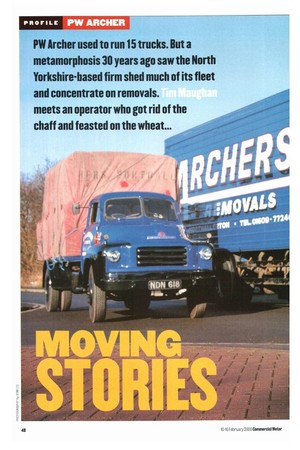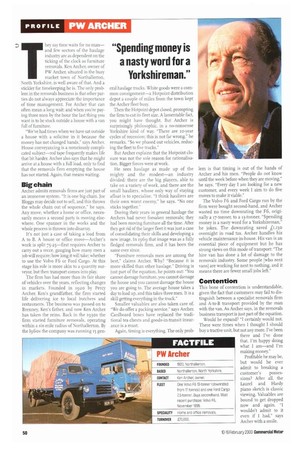PW Archer used to run 15 trucks. But a metamorphosis
Page 50

Page 52

If you've noticed an error in this article please click here to report it so we can fix it.
30 years ago saw the North Yorkshire-based firm shed much of its fleet and concentrate on removals.
meets an operator who got rid of the chaff and feasted on the wheat...
D hey say time waits for no man—
and few sectors of the haulage industry are as dependent on the ticking of the clock as furniture removals. Ken Archer, owner of PW Archer, situated in the busy market town of Northallerton.
North Yorkshire, is well aware of that. And a stickler for timekeeping he is. The only problem in the removals business is that other parties do not always appreciate the importance of time management. For Archer that can often mean a long wait: and when you're paying three men by the hour the last thing you want is to be stuck outside a house with a van full of furniture.
"We've had times when we have sat outside a house with a solicitor in it because the money has not changed hands," says Archer. House conveyancing is a notoriously complicated subject—red tape frequently makes life that bit harder. Archer also says that he might arrive at a house with a full load, only to find that the removals firm emptying the house has not started. Again, that means waiting.
Big chain
Archer admits removals firms are just part of an immense system. "It is one big chain. Joe Bloggs may decide not to sell, and this throws the whole chain out of sequence," he says. Any move, whether a home or office, necessarily means a second party is moving elsewhere. One spanner in the works and the whole process is thrown into disarray.
It's not just a case of taking a load from A to B. A house or office move—Archer's work is split 75-25—first requires Archer to carry out a recce, gauging how many men a job will require; how long it will take; whether to use the Volvo F6 or Ford Cargo. At this stage his role is more akin to a quantity surveyor, but then transport comes into play.
The firm has had more than its fair share of vehicles over the years, reflecting changes in markets. Founded in 1920 by Percy Archer, Ken's grandfather, the firm started life delivering ice to local butchers and restaurants. The business was passed on to Brenney, Ken's father, and now Ken Archer has taken the reins. Back in the 1930s the firm started furniture removals, operating within a six-mile radius of Northallerton. By the 1960s the company was running 15 gen eral haulage trucks. White goods were a common consignment—a Hotpoint distribution depot a couple of miles from the town kept the Archer fleet busy.
Then the Hotpoint depot closed, prompting the firm to cut its fleet size. A lamentable fact, you might have thought. But Archer is surprisingly philosophic, in a no-nonsense Yorkshire kind of way. "There are io-year cycles of recession; this is not far wrong," he remarks. "So we phased out vehicles, reducing the fleet to five trucks."
But Archer explains that the Hotpoint closure was not the sole reason for rationalisation. Bigger forces were at work.
He sees haulage as made up of the mighty and the modest—an industry divided: there are the big players, able to take on a variety of work, and there are the small hauliers, whose only way of staying afloat is to specialise. "I think hauliers are their own worst enemy," he says. "No one sticks together."
During their years in general haulage the Archers had never forsaken removals; they had been moving furniture all the time. After they got rid of the larger fleet it was just a case of consolidating their skills and developing a new image. In 1969 that image was as a fully fledged removals firm, and it has been the same ever since.
"Furniture removals men are among the best," claims Archer. Why? "Because it is more skilled than other haulage." Driving is just part of the equation. he points out: "You cannot damage furniture, you cannot damage the house and you cannot damage the house you are going to. The average house takes a day to load up, and this takes three men. It is a skill getting everything in the truck."
Smaller valuables are also taken care of. "We do offer a packing service." says Archer. Cardboard boxes have replaced the traditional tea chests and goods-in-transit insurance is a must.
Again, timing is everything. The only prob lem is that timing is out of the hands of Archer and his men. "People do not know until the week before when they are moving," he says. "Every day I am looking for a new customer, and every week I aim to do five moves to make it viable."
The Volvo F6 and Ford Cargo run by the firm were bought second-hand, and Archer wasted no time downrating the F6, originally a 17-tonner, to a 9-tonner. "Spending money is a nasty word for a Yorkshireman," he jokes. The downrating saved LI,i3o overnight in road tax. Archer handles his vehicle maintenance in-house. His van is an essential piece of equipment but he has strong views on this mode of transport: "The hire van has done a lot of damage to the removals industry. Some people [who rent vans] are working for next to nothing, and it means there are fewer small jobs left."
Contention
This bone of contention is understandable, given the fact that customers may fail to distinguish between a specialist removals firm and A-to-B transport provided by the man with the van. As Archer says, in the removals business transport is just part of the equation.
Would he expand? "I certainly would not. There were times when I thought I should buy a tractive unit, but not any more. I've been there and I've done that. I'm happy doing what 1 am—and I'm making money."
Profitable he may be, but would he ever admit to breaking a customer's possessions? After all, the Laurel and Hardy piano sketch is classic viewing. Valuables are bound to get dropped now and again. "I wouldn't admit to it even if I had," says Archer with a smile.












































































































